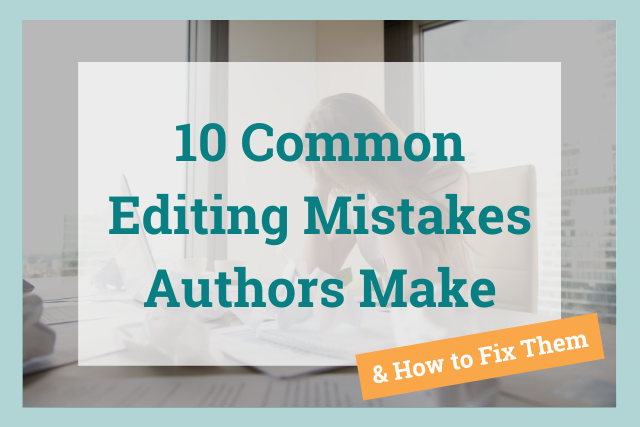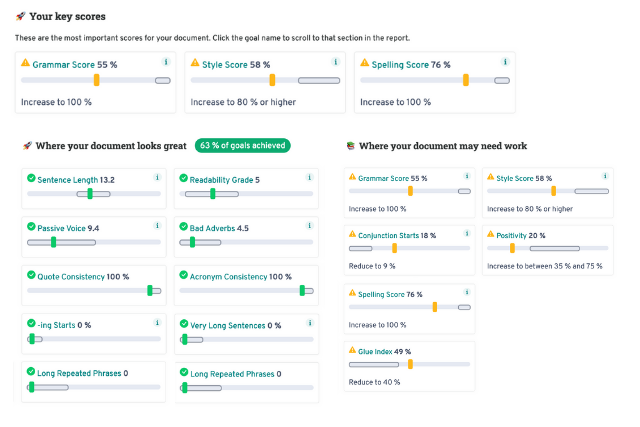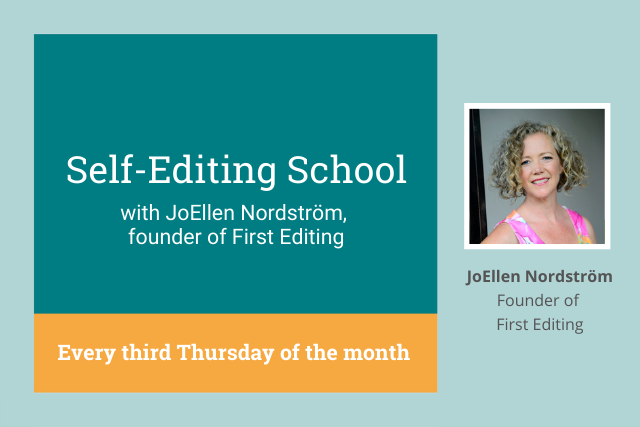Watch JoEllen's live training on the 10 most common editing mistakes authors make, then keep reading for more tips:
On to the article.
10 Common Mistakes Authors Make When Editing

The Top 10 List
There are thousands of minor details you must consider when writing a manuscript, regardless if your topic is fiction, non-fiction, business, or academic research. It is important you know the basics to create a strong self-editing foundation.
However, to keep this presentation and blog post within reason, today we will condense and discuss the top ten mistakes that ALL authors make.
More importantly, let’s learn how to fix these mistakes with effective self-editing so you get the best return on investment when working with professional editors.
I am creating this new condensed list by combining the top technical mistakes made by authors according to academic research projects (Stanford University, University of Wisconsin-Madison) with our professional editors’ experiences.
For readers who love to dig deeper and learn more, I have included links which reference additional supporting online articles.
Drum roll, please.
Here are my top 10 common mistakes writers make:
- Grammar mistakes
- Misspelling and typos
- Punctuation errors
- Citation inaccuracy
- Writing weaknesses
- Word omissions and misuse of wrong words
- Structural blunders at different stages of writing and editing (sentence, paragraph, and developmental levels)
- Relying solely on software and/or tools
- Skipping straight to editing or editing while still writing
- Relying solely on self-editing techniques
How do we fix these errors?
To win the editing battle, you need to understand the foundation of each mistake. So the secret to becoming a better self-editor while mastering your writing skills is to learn the basics of grammar, spelling, and punctuation, while strengthening your writing skills daily.
Let’s take a closer look at each in turn.
1. Grammar Mistakes
Grammar is the system we use to structure language and create well-formed sentences.
The most common grammar blunders include:
- Wrong word use or confusion
- Vague pronoun references
- Faulty sentence structure or parallelism
- Unnecessary shift in verb tenses
- Fused (run-on) sentence structure or sprawl
- Lack of pronoun/antecedent agreement
- Sentence fragments
- Misplaced or dangling modifiers
- Incorrectly used pronouns
The best solution? Learn the grammar rules.
Want an easier solution? Use a grammar tool DAILY that shows your errors and helps you to make corrections during the writing and self-editing process. You’ll start to learn the rules without even realizing.
Unfortunately, grammar tools and plug-ins will not capture ALL errors, and they often make wrong suggestions for corrections. However, they are still powerful and, in my professional opinion, necessary.
I recommend ProWritingAid because it tells you why it’s suggesting each change, with videos and articles to help you understand the suggestions. You will strengthen your writing skills daily and have significant help during the self-editing phase.
2. Misspelling and Typos
Using Artificial Intelligence (AI) tools such as ProWritingAid will help you to identify some (but not all) of your spelling errors during revisions and self-editing.
Ensure you are using your built-in spell check correctly. Check your profile for language preferences. Make certain it is using the right country and settings for your needs. If you are writing in British English, be sure that your spell check or grammar tool is making suggestions based upon the UK English and not the American English versions.

3. Punctuation Errors
Punctuation is a system of symbols and marks used to enhance, separate, and clarify sentences and their meanings. To use correct punctuation, you will need to master punctuation marks such as the demanding and mystifying commas, apostrophes, quotations, and hyphens.
The most common punctuation errors include:
- Omitted, misused, superfluous, or spliced commas
- Mechanical quotation errors
- Unnecessary or missing capitalization
- Needless or misplaced apostrophes
- Poorly integrated quotations
- Absent or dispensable hyphens
Again, it is necessary to learn basic punctuation rules to survive writing critiques. The first step to punctuation success is using an editing tool. Obviously, I continue to recommend ProWritingAid as all our editors have this tool in their professional arsenal to win the editing battle.
Other options to increase your knowledge of grammar, spelling, and punctuation include:
- Courses for editing and writing
- Books, grammar manuals, blog posts, podcasts, and online searches/references (Just “google” it!)
- Reading—yes, reading helps your writing! The more you read correct grammar, spelling, and punctuation, the better your writing becomes.
Want an alternative solution for punctuation? Leave it to the professional editors when you are ready for a technical edit. All writing which you will publicly share or distribute needs professional editing anyhow. Instead of stressing, just save your questions for the pros.
4. Citation Inaccuracy
Your first step to success with citations and references is to actively use a citation style manual. This provides a set of rules on how to cite your sources.
Always use a manual appropriate to your writing’s topic and genre.
Note that general style guides help you maintain a consistent writing style, tone, and voice, while a manual dictates how you must accurately cite and reference your papers.
5. Writing Weaknesses
Does your prose suffer from repetitive words, clichés, crutch words, sticky words, and such?
Can you even identify these offenses?
Find out by running a report to identify your writing strengths and weaknesses.
ProWritingAid’s Summary Report gives you personalized goals to help you structure your self editing. Whether you use too many bad adverbs or lack sentence variety, ProWritingAid will let you know and get you on the way to eliminating those weaknesses.

6. Word Omissions/Wrong Words
Catching omissions and incorrectly used words is a laborious task. A good spell checker will catch some (but not all) of the incorrect words used during writing. However, if you spell the word correctly, the bot may not actually “see” the error. ProWritingAid’s Homonyms Report helps you check commonly confused words to make sure you’re using the right one.
Omissions in writing can also refer to not supporting your manuscript’s ideas, proposals, or statements. An experienced and certified editor who is an expert in your subject can easily help point out areas which need additional support or documentation.
7. Structural Blunders
The organization and structure of your manuscript requires different evaluations and corrections at different stages. It is always important to know and differentiate the editing levels so that you can accurately achieve a set goal during each revision.
While a developmental content edit is essential to evaluating your overall structure, presentation, and substantiation, it is not the best time to focus on more minor details. We address the sentence level technical corrections during the final copy edit.
Levels of Editing
- Developmental, Structural, Content, and/or Story Editing is essential during the outlining and initial evaluation of the manuscript’s presentation as a whole
- Line Editing is necessary during the multi-revisional stages of editing when you are focusing on overall style and cohesiveness of your writing from line to line
- Copy Editing is the final edit which ensures that grammar, spelling, and punctuation is accurate from one sentence to the next before you format and publish
Please note that although we define these edits as stages, the journey is not linear. Often creative changes require further overall revisions and structural corrections.
Learn more about each stage from four industry experts in this replay of our live training session:
1) Story Editing: Kristina Stanley from Fictionary will discuss how to perform an effective story edit
2) Copy Editing: Lisa Lepki from ProWritingAid will be sharing tips and techniques to make your copy edit as painless as possible
3) Professional Editing: JoEllen Nordstrom will be talking about how to get the best out of your professional editor
4) Self-Publishing: Tara Cremin will help you understand the process of self-publishing your work.
8. Over-Reliance on Software/Tools
Writing software, editing tools, and the built-in spell check within various platforms are excellent assists. However, they do not replace the in-depth evaluation and writing critique you want and need from a professional human editor.
Use as many plugins, extensions, platforms, and software as feels right for you. I encourage you to take advantage of artificial intelligence based tools to simplify your editing tasks while improving your writing techniques.
Self-editing tools will continually question your choices in grammar, spelling, punctuation, citations, words, and more. To ensure your responses are correct and accurate, you will also need a professional editor with experience in your subject and/or genre.
The additional benefit of using self-editing tools is that you will get the best return on your investment from your professional editor. Professional editors focus on your high-level content, structure, cohesiveness, and presentation. Meanwhile, the grammar checker highlights the technical tweaks and corrections for easy review and approval during your editor’s final review and critique.
9. Editing While Still Writing
Writing and editing are two entirely different and separate processes. It is important to not overlap them. When writing, you engage your brain creatively. Editing is a more technical procedure based on rules and logic. Allow yourself to enjoy each stage individually.
After you have completed your creative presentation, you can then begin self-editing.
Achieve self-editing success by following these guidelines.
- Stop editing while writing. Write creatively first, and edit logically afterwards.
- Finish writing completely and then quickly “proof” your “final” version. You can do this in sections at the end of your writing sessions with the use of your grammar checker.
- Take a break from writing when you have completed your manuscript. Return with fresh perspective and the sole intent of tackling editing in different stages for the content, line, and copy edits.
- Complete your developmental revisions first while ignoring the technical copy edits. Content or story editing is more creative and often hindered when playing with fussy commas.
- Read your manuscript aloud in sections to tackle it line by line and sentence by sentence.
10. Over-Reliance on Self-Editing
After editing and revising, it is time to get professional editing services from humans trained to help you succeed in your publishing tasks.
You only get one chance for first impressions, so always have your writing edited before publicly sharing or submitting.
Ensure you find a certified, professionally vetted editor experienced in your genre with a proven track record with client references. Ask for a firm price quote, an outline of the editing process, and a sample critique of your writing with their professional recommendations.
Wherever you are in your editing journey, take the time to self-edit and learn. You can master your writing skills and achieve your goals.
References:
- Stanford University, Hume Center, accessed 3 February 2021, Top Twenty Errors in Undergraduate Writing | Hume Center for Writing and Speaking | Stanford Undergrad
- Lunsford, Andrea A. and Karen J. Lunsford. “Mistakes are a Fact of Life: A National Comparative Study.” CCC 59 (2008), pp. 781–806.
- University of Wisconsin-Madison, accessed 3 February 2021, Twelve Common Errors – The Writing Center – UW–Madison
- Kobo Writing Life, July 18, 2016, accessed 3 February 2021, The Most Common Editing and Proofreading Mistakes That Writers Usually Make
- Author Learning Center, accessed 3 February 2021, 7 Mistakes Writers Almost Always Make When Self-Editing


